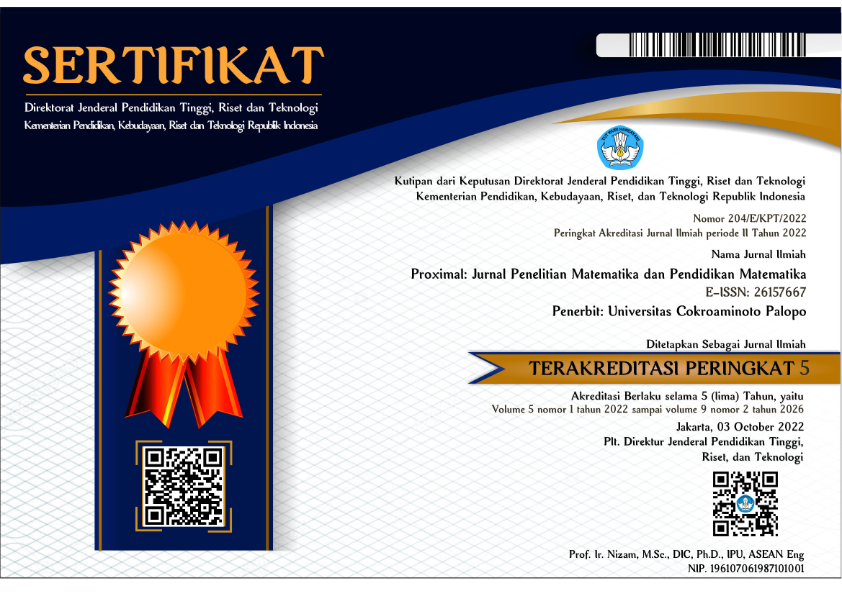Efektivitas Penggunaan Model Problem Based Learning Berbantuan Grocery Shopping dalam Meningkatkan Kemampuan Pemecahan Masalah Matematika Siswa pada Materi Pecahan
DOI:
https://doi.org/10.30605/proximal.v5i2.1832Keywords:
Problem Based Learning, Mathematical Problem Solving, Grocery Shopping, FractionsAbstract
Tujuan dari penelitian ini adalah untuk melihat apakah penggunaan pembelajaran Problem Based Learning yang dipadukan dengan media Grocery Shopping dapat membantu siswa meningkatkan kemampuan pemecahan masalah matematika pada materi pecahan. Penelitian kuantitatif termasuk dalam penelitian ini di SD Negeri Salatiga 02, subjek penelitian adalah 27 siswa kelas IVA sebagai kelas kontrol yang menggunakan model konvensional dan 28 siswa di kelas IVB yang menggunakan model Problem Based Learning. Observasi dan tes digunakan untuk mengumpulkan data. Data yang diperoleh berdistribusi normal dan homogen, sesuai dengan hasil uji prasyarat. Hasil uji T-test menggunakan Independent Sample T-test dengan nilai 0,000 < 0,05 maka Ho ditolak yang menunjukkan bahwa terdapat perbedaan kemampuan pemecahan masalah matematika. Meningkatnya kemampuan pemecahan masalah matematis kelas IVB dengan memanfaatkan model Problem Based Learning dengan media Grocery Shopping telah dibuktikan, dengan hasil pengukuran awal 65,9 meningkat menjadi 86,0, dengan kenaikan sebesar 20%. Maka model pembelajaran Problem Based Learning berbantuan Grocery Shopping berpengaruh secara signifikan dan dapat digunakan untuk alternatif model dan media pembelajaran pada siswa kelas IV pada materi pecahan.
References
Arta, I. M., Japa, I. G., & Sudarma, I. K. (2020). Problem Based Learning Berbantuan Icebreaker Berpengaruh Terhadap Kemampuan Pemecahan Masalah Matematika. Mimbar PGSD.
Ashari, N. W., & Salwah. (2017). Problem Based Learning (PBL) dalam Meningkatkan Kecakapan Pembuktian Matematis Mahasiswa Calon Guru. JMPM: Jurnal Matematika dan Pendidikan Matematika, 100-109. DOI: https://doi.org/10.26594/jmpm.v2i2.891
Eismawati, E., Koeswanti, H. D., & Radia, E. H. (2019). Peningkatan Hasil Belajar Matematika Melalui Model Pembelajaran Problem Based Learning (PBL) Siswa Kelas 4 SD. Jurnal Mercumatika. DOI: https://doi.org/10.26486/jm.v3i2.694
Nahdi, D. S. (2018). Eksperimentasi Model Problem Based Learning dan Model Guided Discovery Learning terhadap Kemampuan Pemecahan Masalah Matematis Ditinjau dari Self Efficacy Siswa. Jurnal Cakrawala Pendas. DOI: https://doi.org/10.31949/jcp.v4i1.711
NCTM. (2000). Principles and Standards for School Mathematics. United States: The National Council of Teachers of Mathematics.
Nurmadiah. (2016). Media Pendidikan. Jurnal Al-Afkar. DOI: https://doi.org/10.28944/afkar.v5i1.109
Rohani. (2019). Media Pembelajaran.
Ruchaedi, D., Suryadi, D., & Herman, T. (2016). Pengaruh Problem Based Learning (PBL) Terhadap Kemampuan Heuristik Pemecahan Masalah dan Sikap Matematis Siswa Sekolah Dasar. Jurnal Pendidikan Dasar Kampus Cibiru. DOI: https://doi.org/10.17509/eh.v7i1.2792
Sugiyono. (2015). Metode Penelitian Pendidikan. Bandung: Alfabeta.
Sumartini, T. S. (2016). Peningkatan Kemampuan Pemecahan Masalah Matematis Siswa melalui Pembelajaran Berbasis Masalah. Jurnal Pendidikan Matematika STKIP Garut. DOI: https://doi.org/10.31980/mosharafa.v5i2.391
Wahyudi, & Anugraheni, I. (2017). Strategi Pemecahan Masalah Matematika. Salatiga: Satya Wacana University Press.
Wati, E. R. (2019). Ragam Media Pembelajaran.
Yandhari, I. A., Alamsyah, T. P., & Halimatusadiah, D. (2019). Penerapan Strategi Pembelajaran Problem Based Learning untuk Meningkatkan Kemampuan Pemecahahan Masalah Matematis Siswa Kelas IV SD. Jurnal Matematika Kreatif-Inovatif. DOI: https://doi.org/10.15294/kreano.v10i2.19671
Yuliasari, E. (2017). Eksperimentasi Model PBL dan Model GDL Terhadap Kemampuan Pemecahan Masalah Matematis Ditinjau dari Kemandirian Belajar. Jurnal Ilmiah Pendidikan Matematika, 1-10. DOI: https://doi.org/10.25273/jipm.v6i1.1336
Zaozah, E. S., Maulana, M., & Djuanda, D. (2017). Kemampuan Pemecahan Masalah Dan Disposisi Matematis Siswa Menggunakan Pendekatan Problem-Based Learning (PBL). Jurnal Pena Ilmiah.
Downloads
Published
Issue
Section
License
In submitting the manuscript to the journal, the authors certify that:
- They are authorized by their co-authors to enter into these arrangements.
- The work described has not been formally published before, except in the form of an abstract or as part of a published lecture, review, thesis, or overlay journal.
- That it is not under consideration for publication elsewhere,
- That its publication has been approved by all the author(s) and by the responsible authorities – tacitly or explicitly – of the institutes where the work has been carried out.
- They secure the right to reproduce any material that has already been published or copyrighted elsewhere.
- They agree to the following license and copyright agreement.
License and Copyright Agreement
Authors who publish with this journal agree to the following terms:
- Authors retain copyright and grant the journal right of first publication with the work simultaneously licensed under Creative Commons Attribution License (CC BY 4.0) that allows others to share the work with an acknowledgment of the work's authorship and initial publication in this journal.
- Authors are able to enter into separate, additional contractual arrangements for the non-exclusive distribution of the journal's published version of the work (e.g., post it to an institutional repository or publish it in a book), with an acknowledgment of its initial publication in this journal.
- Authors are permitted and encouraged to post their work online (e.g., in institutional repositories or on their website) prior to and during the submission process, as it can lead to productive exchanges, as well as earlier and greater citation of published work.















